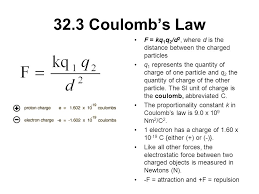coulomb's law problem
@shadow @vocaloid
|dw:1552966872554:dw|
They gave you force
You're solving for charge which is above r^2 aka 0.1^2
|dw:1552967011427:dw|
the thing is, what if the charges arent equal
Also the charge of an electron is 1.60 x 10^-19 Coulombs
That'll be useful for the second part.
uh...what do you mean
iwannacry
ok whats the answer Let me work it out
Lowkey you just need to put numbers in the variables.
I got 2.24E-6
K so I just multiplied the force by the distance squared, divided by the constant and got 5 x 10^-12
I don't know how you got that number but the formula should look like this: \[F_{e} = k \frac{ q }{ r^2 }\] Where in this format, we're solving for the electrical force which is equal to Coulomb's constant multiplied by the charge divided by the distance squared.
Just make that negative since I just used the magnitude of the force (4.5).
Wouldn't there be two charges because there are two items?
Idk maybe I'm wrong, I took two NyQuils and three supplement pills
I know but we are not given the charges of either, and are solely seeking the charge of one object.
I remember using q singularly before in some instances. Here for electric field they illustrate the charge as being "Qsource" and not q times q, so there is validity for this.
oh
damn i dont have an eraser
Join our real-time social learning platform and learn together with your friends!


